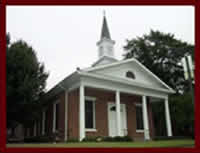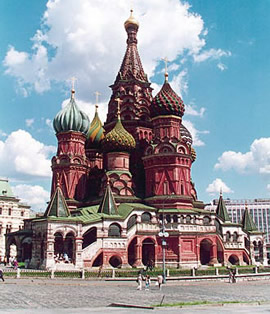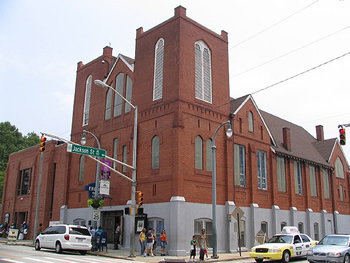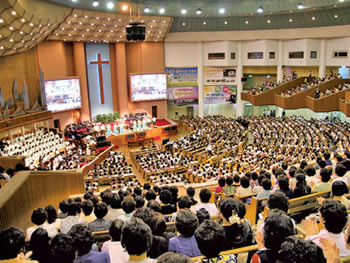"A Loyal Member of a Dysfunctional Family"
Why I Go to Church
For Sunday January 16, 2011
Lectionary Readings (Revised Common Lectionary, Year A)
Isaiah 49:1–7
Psalm 40:1–11
1 Corinthians 1:1–9
John 1:29–42
When I was in high school, my father stopped going to church. He never went back. Whatever else that was, it was an act of bravery, for at our small church in a small town he still dropped us off and picked us up every Sunday (my mother didn't drive). I still remember how awkward that felt, seeing dad waiting at the curb in his car, seeing and being seen by the neighbors with whom he used to worship. I like to think that my father lost his faith in the church as an institution but not his faith in God or the gospel.
 |
My home church in North Carolina. |
There are good reasons to quit the church. Tops on most people's list are gross hypocrisy, violence, and intolerance. In the name of God's love Christians have slaughtered Muslims (the Crusades), Jews (the Holocaust) and Native Americans (see The Conquest of America by Tzvetan Todorov). We have humiliated and exploited slaves, women and gays. Clerical pedophilia has devastated thousands of families. And whether Orthodox, Catholic or Protestant, fellow Christians have persecuted each other with similar sadistic cruelty.
Other people leave church because they find it irrelevant, mediocre, boring or perfunctory. In her essay "An Expedition to the Pole," Annie Dillard describes her church experience: "Week after week I was moved by the pitiableness of the bare linoleum-floored sacristy which no flowers could cheer or soften, by the terrible singing I so loved, by the fatigued Bible readings, the lagging emptiness and dilution of the liturgy, the horrifying vacuity of the sermon, and by the fog of dreary senselessness pervading the whole, which existed alongside, and probably caused, the wonder of the fact that we came; we returned; we showed up; week after week, we went through it."
Christians have burned books, defended the dubious, supported pseudo-science, and avoided hard questions. In movies like Babette's Feast (1987) and Chocolat (2000) church is portrayed as a place of moralistic, hair-splitting, repressed people who never have any fun and who don't really believe what they say they do. In his book What's So Amazing About Grace?, Phil Yancey tells the story of a prostitute who, when she was encouraged to go to church for help, responded, “Church! Why would I ever go there? I already feel terrible about myself. They would just make me feel worse.”
 |
Saint Basil's Cathedral in Moscow. |
Still others leave church because our pious platitudes contrast so sharply with our unanswered prayers, bitter disappointments, intellectual doubts, nagging questions, or life traumas. In her memoir Leaving Church (2006), Barbara Brown Taylor seems to have left church precisely in order to save her faith.
One response to the church's failures is to long for a return to the "golden age" of the earliest believers. Unfortunately, the epistle for this week (1 Corinthians 1:1–9) disabuses us of this romantic fallacy. Paul taught at Corinth for eighteen months (Acts 18:11), and he knew those people well. In his letters to the believers at Corinth Paul addressed numerous ugly issues — sectarian divisions in which both sides claimed to be more spiritual than the other, boasting about incest ("and of a kind that does not occur even among pagans," 1 Corinthians 5:1), lawsuits between fellow Christians, eating food that had been sacrificed to pagan idols, disarray in worship services, and predatory pseudo-preachers who masqueraded as super-apostles.
I've often wished for a better church, but Corinth is hardly a model to emulate. The communities of the first believers were as compromised as our own today. But despite its many and obvious faults, and despite the futility of finding a pure or perfect church of any time or place, like Annie Dillard I keep coming back for more church week after week. Why bother?
First, I lower my expectations and expand my horizons. The realm of God's kingdom is not identical with the institutional church. At its best, the church mediates and points to God's kingdom, but God often works beyond and in spite of the church. Jesus reminded us of this when he compared God's kingdom to a fish net that trawls the sea, catching both the good and the bad, or to wheat and tares that grow together. The inner circle of Jesus's followers included the traitor Judas and the betrayer Peter. "There are many sheep without," wrote Augustine, "and many wolves within."
 |
Martin Luther King Jr.'s historic Ebenezer Baptist Church. |
Further, despite its shortcomings, when I go to church I experience much good — couples working to hold their marriages together, parishioners longing to be good citizens, generosity to the poor, hospital visitation of the sick, efforts at building community in an otherwise individualistic society, adoption of orphans, outreach to victims of HIV and AIDS, care for unwed teenage mothers, building schools and hospitals in places that would otherwise never have them, and so on.
Focusing only on our faults distorts the true nature of the church. For all of the barbarities of Spanish colonization, there is often a Bartolome de las Casas (1484–1566), a Dominican priest who defended Native Americans for fifty years. For every impulse of greed, there's the selfless compassion of a Mother Teresa, whether known or unknown. For every craven acquiescence to political power, there's a Thomas More (1478–1535) who spoke truth to those powers.
Without denying that God's kingdom exists beyond the limits of the church, I also believe that in some mysterious manner the church is God's ordained human institution where he has chosen to work. The most famous (and controversial) expression of this truth comes from Cyprian (200–258), bishop of Carthage in North Africa. In his treatise On the Unity of the Church, he wrote that "outside of the church there is no salvation," and similarly, "you cannot have God for your Father unless you have the Church for your Mother." For Protestants who cringe at these words, both Calvin and Luther quoted them almost verbatim.
Because of this, I want to situate myself where God has said he is present. The writer Flannery O'Connor said that she sat at her writing desk every morning so that she would be ready if and when an idea came to her. Likewise, in her memoirs Ordinary Time, Nancy Mairs writes that she moved beyond her lapsed Catholic faith and returned to church, even though she still had many questions, so that she could "prepare a space into which belief could flood." It might be that authentic faith results from rather than precedes fidelity to the church.
 |
Yoido Full Gospel Church, Seoul, the largest church in the world. |
Finally, I go to church out of an acute sense of my own needs. Being a Christian is one of the things in life that you can't do alone. During the Protestant Reformation, the Renaissance humanist Erasmus (1466–1536) locked horns with Luther over their contrasting views of human nature. Erasmus rejected Luther's pessimistic views of the human will and natural reason, so he returned to the deeply troubled Catholic church. "Therefore I will put up with this Church until I see a better one," wrote Erasmus; "and it will have to put up with me, until I become better." I'm thankful for a church, however imperfect, that has welcomed my imperfect self with my imperfect faith.
We should never ignore the church's faults and failures. Rather, we should name them, own up to them, repent of them, and do what we can to correct them. Losing our illusions about church (dis-illusionment) is necessary and good. Thus did Luther, overwhelmed with the troubles of medieval Catholicism, offer a "spectacularly disloyal form of loyalty to the church" when he demanded radical reform (MacCulloch).
One of our earliest Christian creeds is the Old Roman Creed, dated to the late second century. One of the fragments that predates it simply reads, "I believe in God the Father Almighty, and in Jesus Christ His only Son, our Lord. And in the Holy Spirit, the holy Church, the resurrection of the flesh." Such early creeds served as baptismal confessions, as the basic instructional material used for teaching, as a summary of our faith, and as affirmations used in public worship. The centrality of the church in such a succinct expression of faith serves as an important reminder. And so with the Benedictine nun Joan Chittister, I aspire to be what she calls "a loyal member of a dysfunctional family."
For further reflection
See Phillip Yancey, Church; Why Bother? (1998), and Soul Survivor; How My Faith Survived the Church (2001); Garry Wills, Why I Am a Catholic (2002); Barbara Brown Taylor, Leaving Church; A Memoir of Faith (2006); and Eric Lax, Faith Interrupted (2010).
Image credits: (1) Fuquay-Varina Presbyterian Church; (2) Moscow.info; (3) City-Data.com; and (4) MetroNews.ca.





